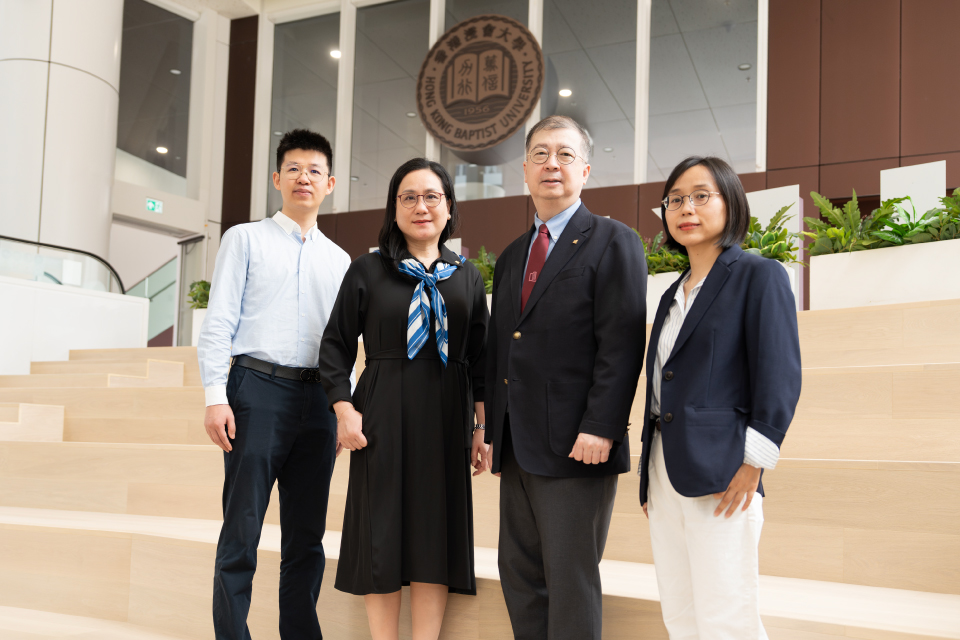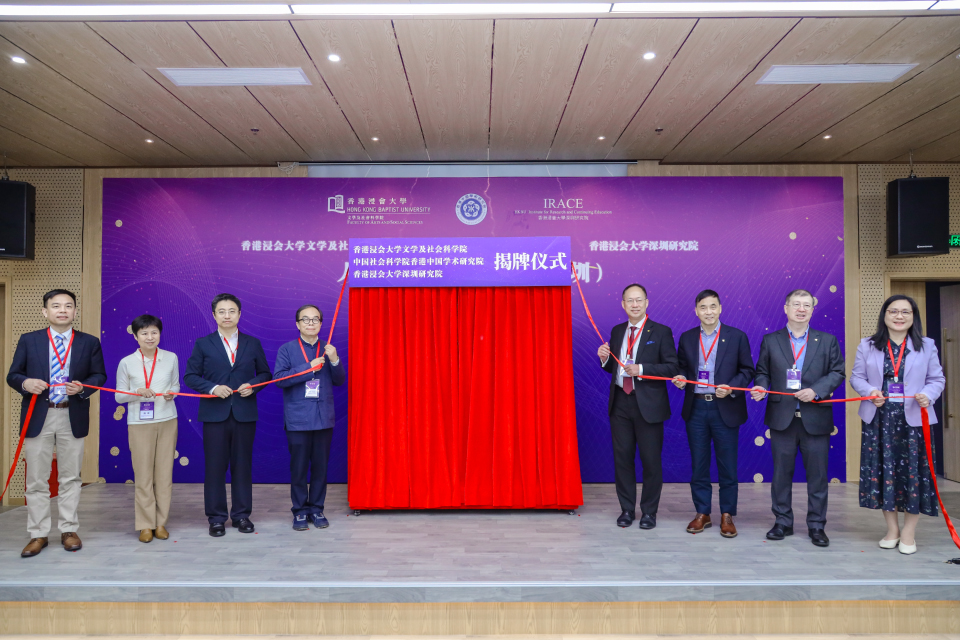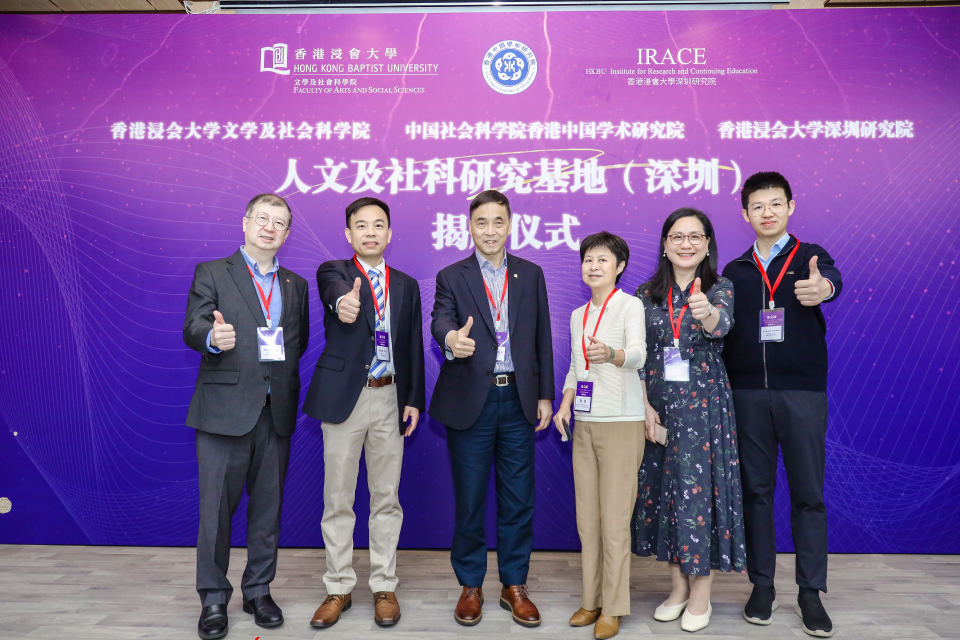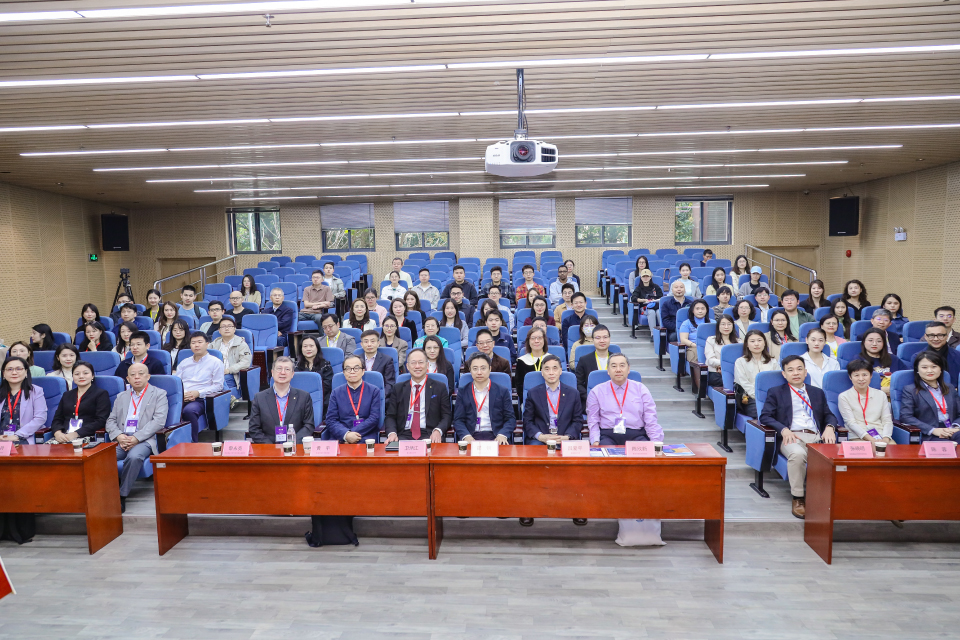Discover HKBU
Advancing Knowledge: Establish Humanities and Social Sciences Research Base (Shenzhen)
30 Apr 2025
HKBU has collaborated with the Chinese Institute of Hong Kong of the Chinese Academy of Social Sciences (CASS) and the HKBU Shenzhen Research Institute to establish the Humanities and Social Sciences Research Base (Shenzhen). The new research base, officially unveiled at the Virtual University Park in Shenzhen on 15 March, marks an important chapter in the University's strategy for cross-border collaboration and innovation in the Greater Bay Area (GBA).
The ceremony was officiated by Professor Alex Wai, President and Vice-Chancellor of HKBU; Professor Huang Ping, President of the Chinese Institute of Hong Kong of CASS; Professor Lyu Aiping, Vice-President (Research and Development) of HKBU; Professor Daniel Lai, Dean and Professor Yang Chun, Associate Dean (Research) of the Faculty of Arts and Social Sciences (FASS); and Professor Cheung Yiu-ming, Dean of the HKBU Shenzhen Research Institute. The ceremony was attended by local government officials and leaders in humanities and social sciences from several major GBA universities.
“The establishment of this base is a critical milestone in HKBU’s long-term strategy,” says Professor Daniel Lai. “It deepens our engagement with the GBA, forges stronger academic and industry partnerships, and creates a central hub for transdisciplinary research in the region.”
At the heart of this new initiative lies the ambition to transcend conventional academic boundaries. By combining HKBU’s dynamic academic culture with CASS’s authoritative research infrastructure and Shenzhen’s strategic location, the Base aims to become a powerhouse of ideas in fields as diverse as digital governance, cultural innovation, AI and society, and social development.
For Professor Yang Chun, the research base brings her long-standing work in economic geography to the forefront of regional discourse. “My current research focuses on industrial upgrading and digital transformation within the GBA,” she explains. “The Base allows us to expand these efforts through cross-border collaborations, joint research programmes, and real-world engagement with policymakers and industry players.”
The Base’s design reflects a forward-thinking ethos—academic exchanges, student visits, collaborative workshops, and joint publications are all part of a well-orchestrated strategy to advance humanities and social sciences research with global relevance and local roots. Professor Yang highlights how the platform enhances transdisciplinary dialogue: “Through regular workshops with international and Mainland scholars, we can inject GBA perspectives into global debates while translating research into impactful policy.”
For younger researchers, the Base opens up invaluable opportunities. Dr Song Jun, whose work explores AI’s applications in environmental regulation and smart cities, sees the new platform as a gateway to both resources and collaboration. “It gives me access to a network of like-minded experts and the tools needed to accelerate innovation,” he says. “The transdisciplinary nature of the Base aligns perfectly with my approach to solving complex urban challenges.”
Similarly, Dr Shao Jing, whose work focuses on auditory decline in aging populations, sees the Base as a lifeline for translational research. “It offers lab space and logistical support critical to my studies on Mandarin-speaking older adults. It also connects me to hospitals and industry partners in Guangdong and Shanghai, making it easier to turn research into real-world solutions.”
The collaborative energy doesn’t end there. According to Professor Lai, the success of the Base is also a reflection of the dedication and rigor of the faculty and PhD students at FASS. “Their passion and academic excellence were instrumental in shaping this initiative,” he says. “They are not only advancing scholarship, but also helping us build a robust ecosystem of knowledge that spans the region.”
Looking ahead, HKBU envisions the Base as an evolving hub—attracting global talent, deepening regional integration, and tackling challenges that no single discipline or city can face alone. Professor Lai concludes, “We are committed to building an ecosystem of knowledge-sharing and innovation that can drive forward research agendas that are globally relevant. Our efforts will continue to center on the key principles of collaboration, academic excellence, and societal impact.”



